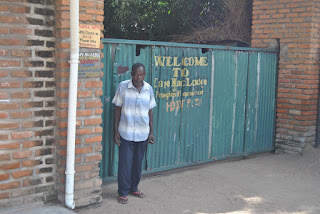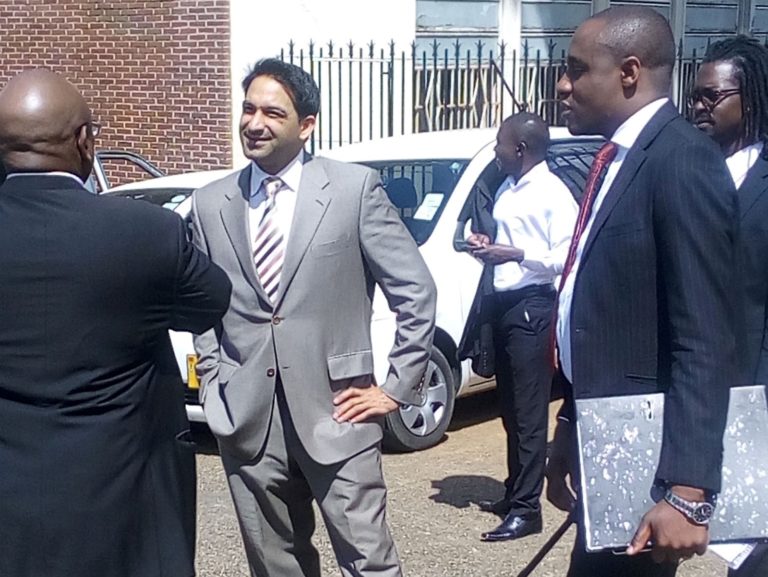BY PIJ INVESTIGATIONS
“All customary land is hereby declared to be the lawful and undoubted property of the people of Malawi and is vested in perpetuity in the Resident for the purposes of this Act.” the old Land act
Many years ago, the picturesque fishing village Chembe, which is sandwiched between the clearest point of blue waters of Lake Malawi and the mountains of Cape Maclear, on the foot of Lake Malawi national park, attracted Frenchman Rodger Leclercq to invest in tourism. It is the abundance of the lake water and the surrounding arable land that also proved irresistible to the ancestors of Ben Namkumba.
The precise year of the arrival of the Namkumbas, like those of many Malawian villagers who claim ownership of customary land, is not known. The arrival certainly took place earlier than 1981, the year government declared the nearby forest and shores a protected game reserve: The Lake Malawi National Park.
But the village, and Ben Namkumba, remember the year Leclercq arrived in the village and asked his family for a piece of land to rent and build his Cape Mac Lodge.
On 26th October 2002, Leclercq through a man called Enock Blake negotiated and entered into a rental agreement with the Namkumbas, who will be paid a monthly fee of 10 000 kwacha.
Enock Blake was a companion of Rodger Leclercq and facilitated a meeting with Ben Namkumba.
The area which was subject to the agreement was mostly used as farmland. It had only one house, belonging to Ben Namkumba’s mother. Two witnesses to the agreement were Lloyd Imman and Joseph Manda (now deceased) plus Group Village Headman Chembe. Both Group Village Headman Chembe and Traditional Authority Namkumba also signed off on the agreement.
Ben Namkumba says he only signed a rental agreement.
Just three years later, the relationship changed. By April 2006, the lodge had stopped paying the rental fees. By 2010 the Namkumba family and sympathizers started protesting, among others, by blocking the road to the lodge, opening a bar close to the lodge that played music, loudly, all night to disturb guests at the lodge– leading to violent clashes with the police.
“Then he started saying he can’t be paying us for land,” said Namkumba.
In the ensuing mayhem, a police officer reportedly beat up the pregnant wife of Namkumba’s younger brother, Greyson.
“One day, mobile police force came with then minister of Tourism Aaron Sangala, they fired teargas and beat up people, I remember grabbing Sangala’s necktie as we confronted each other,” remembers Ben Namkumba.
The situation would get worse before it got better. At some point, Nico Kamanga, a member of the Namkumba family was arrested by police and accused of murdering a guard at the lodge. The police did not prosecute the matter eventually for lack of evidence against Kamanga.
The disagreements between the two sides then were settled at the DC’s office. The Ministry of Tourism through Mr. Isaac Katopola, TA Namkumba, and the DCs office (DC late Thomas Chirwa) were all involved and the lodge paid all outstanding rental fees and a new rent agreement of 30 000 kwacha per month was signed.
The money was being paid through the office of the DC. By 2012, again the lodge stopped paying rent.
“We were then advised to go to court, they told us this white man was difficult,” said Namkumba.
The reason the white man stopped paying for the rentals is that he had said he had bought the piece of land. “He didn’t tell us who sold him the piece of land,” adds Namkumba.
In Rodger Leclercq’s own words
Years ago, before Rodger Leclercq died in June 2021, he provided a statement to court, which clearly confirms that at no point did he buy the piece of land from the Namkumba family.
(Rodger Leclercq’s wife died in 2017 and the lodge is now run by his daughter Natalie).
According to the statement, in 2002, he was looking for land to start a hospitality business when he was approached by Enock Break and Ben Namkumba who offered a suitable piece of customary land. Leclercq said the land was occupied by Ben Namkumba and members of his family.
“Mr. Ben Namkumba was desirous to rent the said piece of land. After preliminary negotiations, we met again on the 25th day of October 2002. On this day, we approached the late Village Headman Chembe to obtain his consent to the said transaction,” wrote the late Leclercq.
According to the late businessman, the government through the Malawi Investment Promotion Agency (MIPA) confirmed to him that the rent agreement was valid and he proceeded to obtain an investment permit.
“Mr. Ben Namkumba and us agreed on rental amount and altered the duration of the lease agreement to 99 years, with the undertaking of Mr. Ben Namkumba, the authorization of both, Village Headman Chembe and Traditional Authority Namkumba, we reduced the same into a small handwritten agreement.”
However, after the lease agreement was taken to the Registrar in Blantyre, Leclercq says he was told the agreement was invalid as customary land in Malawi vests in the President, and people occupying it have a right to use only but cannot sell it.
“Mr. Ben Namkumba was informed by the District Commissioner that the person who had the right to use the land must be willing to surrender his right back to the Ministry of Land when filing an application. Mr. Ben Namkumba and I went to the village headman, and to the traditional authority Namkumba, to have the application sanctioned. When the same was done, the application was officially lodged with the District Commissioner, whose office subjected the application to the office of the Lake Committee and the office of the Registrar of Lands for sanctioning,” reads part of his testimony.
According to Leclercq, the District Commissioner then asked for compensation for the Namkumba family which he paid—a total amount of K110 000 for Ben Namkumba and relocating Mrs. Ginnet Chisendera and Mr. Nevas Lumbe.
It’s a chain of events that the Namkumba family firmly disputes. According to Ben Namkumba, he never signed any changes in terms of change of ownership of land or lease agreement. The money which was paid through the DC’s office was the outstanding rental fees and the relocating of the family was a gentleman’s agreement that was part of the original rental agreement.
The family points to other pieces of evidence to back their claims including the purported lease agreement itself. The signatories of the agreement are Greycon Namkumba and Cape Mac Lodge and Froggies Restaurant (PVT) Ltd.
A copy of the agreement shown to PIJ shows that the name Ben was canceled out on the signatories and replaced with Greyson. The family says this is evidence of fraud. The member of the family is Greycon Abele Phiri and not Greyson Namkumba. And even Greycon Phiri denied ever signing the agreement.
The National ID for Greycon Abele bears different names to the ones on the purported lease agreement he signed on behalf of the Namkumba family.
Enock Blake, an alleged witness on the purported lease agreement, too, rejects ever witnessing the agreement. “I don’t even know how to write,” he told PIJ.
The lease agreement was purportedly entered into by the Namkumba family and owners of Cape Mac Lodge and Froggies Restaurant.
The basis of the land claim was a lease agreement that the village head at the time, Group Village Chembe (now deceased), and members of the Chembe Trust, a development committee for the area, signed with the lodge, consenting to the legal takeover of the area.
In a January 11, 2004 letter to the Ministry of Lands, Physical Planning and Survey the Trust which was headed by the Group Village Headman himself as patron and had a committee whose chairperson is H.D Jali, asked the ministry to grant the lease to Cape Mac Lodge.
“During a meeting at the environmental centre on Saturday, 10th January 2004, Chembe Trust learned that the Cape Mac Lodge and Froggies Restaurant Limited has not yet been granted, by your Ministry, the lease for the allocated land at Cape Maclear on which the lodge will be constructed,” wrote the Trust.
It added: “We would appreciate your diligence in speeding the granting of the lease to Cape Mac Lodge and Froggies Restaurant Limited, as Chembe village is in need of such a project in order to benefit from it.”
The letter does not address the question of land acquisition or mention the Namkumba family at all. When PIJ showed the letter to Mr. Jali, the chairperson of the Trust, he told us he did not author the letter or recall signing it despite acknowledging a signature on the letter as his.
So we asked Mr. Jali what he knows about the sale of the Namkumba land, anyway. And his tale is not something that makes for comfortable listening.
Mr. Jali, a fluent English speaker, and presumably a reader too says he recalls one day, as he was farming in his garden, an agitated and excited Ben Namkumba coming to him with an envelope with some documents. Namkumba approached Jali and asked him a favour. “sign these documents for me,” Namkumba reportedly said, according to Jali, “I am going to DC’s office at the boma.” Jali says he pleaded with Namkumba to allow him the opportunity to study the documents before pending his signature but Namkumba was in a rush. And Jali signed the documents without checking what exactly the documents were.
We showed Mr. Jali, the Chembe Trust letter and asked if, possibly, the document Namkumba asked him to sign, but Jali insisted he had seen that document and could have remembered the document if it was the one.
It’s an event Namkumba denies ever took place. He says for any of the transactions involving the land under dispute, he has never involved Jali and has never even consulted him. “Why should I, he is not even a member of my family and he cannot be my witness,” says Ben Namkumba.
Indeed, none of the documents for rental agreement and the eventual lease agreement from the Ministry of Land has any signature or the name Jali as a witness.
The current Group Village Chembe says the land in the area belongs to the people and not the government hence the Namkumba family is rightfully entitled to the land.
“It’s true this place is a national park, it came in 1980, but when the national park was being established, it found people here. Kamuzu failed to evict us from this place because we used to call ourselves Mphipe—there is a bird in the lake called Mphipe which fish, we cannot leave this place, we can’t leave the fish in this place and start agriculture and other businesses, we are fishermen inside a national park but the land belongs to us,” told PIJ the chief.
As a result, the chief says the people in the area are able to sell and buy land from each other but most prefer to rent out the land to foreign investors and collect rentals.
“Just recently, I gave out my land for construction of a hospital. The land here has ownership. I also have land which I rented to a lodge, they pay me rentals, too,” added the chief.
Current Group Village Headman Chembe
What happened with the Namkumba case, the chief says, is an act of injustice. “The rightful owner who was supposed to do the lease is Ben Namkumba because there was no sale agreement for the land. The land still belongs to the Namkumba family,” adds the chief.
Indeed, several villagers showed us land sale or rent agreements confirming the position that the land in the area belongs to the people and any sale involves the land owners signing a sale agreement with any buyers.
In an interview with PIJ, Cape Mac Lodge current owner Nathalie, daughter of the late Lodger Leclercq, nodded to the fact that the lodge did not pay any money to the family but obtained the lease through an agreement with the DC’s office.
She also told us, that although the court ordered in the lodge’s favour, she was still hoping for an out-of-court gentleman’s agreement to pay off the family but said the economic realities are preventing such prospects, at least, at the moment.
“We have got all the documents with the lawyers,” she told PIJ.
The company’s lawyer, Justin Dzonzi says their client leased the land in compliance with the law.
“All the land that is along the lake shore, according to the Land Act that was there when the Leclerqs came to look for this land, 5 kilometres from the shore land is public land. No person can claim to be his village or his customary land, it means that the village in Namkumba’s village belonged to the government. Even if we said that they had customary land rights, the law said they could not sell the land because it belonged to the government,” said Dzonzi.
He says when the Leclerq approached the family, the agreement with the Namkumba because 99 percent of the lodges and hotels in the area had a similar agreement with community members but when the agreement was taken to the Ministry of Lands, government advised them only government can give out land.
But did the Namkumbas who had customary land rights consent to the arrangement? Were they properly informed of the consequences of the Leclerqs acquisition of the land?
Battle in court
The Namkumba family land saga turned out to be protracted and long, sucking in some of the country’s biggest legal minds and big-name political operatives, on either side of the divide.
The main law governing the dispute was the old land law which was repealed in 2016. The law did not recognise citizens ownership of the land and stated that all customary land belonged to the government. In practice, occupants of such land –like the Namkumbas–were still recognised as rightful users of the land and had to be willing to give up the land if the government had to use it for other purposes or sell it and receive compensation for any development on the land or loss of income which they could generate.
“All customary land is hereby declared to be the lawful and undoubted property of the people of Malawi and is vested in perpetuity in the Resident for the purposes of this Act.” reads the old Land act.
The question facing the courts, with Ben Namkumba and evidence showing he never intended to surrender ‘ownership’ of the land, is whether the Leclerq had a legitimate claim to the land, based on an agreement with the Ministry of Lands while the Namkumbas had not provided any consent to surrender the land.
After the family sued the lodge in 2006, seeking a court injunction to restrain the lodge from obtaining the lease agreement, the then High Court judge, Edward Twea granted the family the injunction in February 2007, noting several irregularities in the manner the lease agreement was taken.
“Such a lease agreement is contrary to the Land Act, more particularly, the Land Development of Lakeshore Plots) (Control) Order Rule 2. Even at custom, I have doubts if one can assign one’s use for twenty years, which is a generation, without abandonment, it is clear from the evidence of the second defendant, however, that the purported lease agreement between Beni Namkumba and the first defendant was illegal,” observed the judge.
But the judge also made another poignant observation:
“…It is clear to me that the agreement was for a fixed period which, on its own, would not give rise to abandonment of the land or making a gift of the land in favor of the first defendant. In the absence of the contrary, I refrain from finding that the plaintiff’s purported family had intended to abandon or make a gift of the land,” ruled the judge.
Justice Twea also observes that Namkumba who had no lawyer in their agreements with the lodge were disadvantaged in the dealings with the lodge which he describes as a multinational company and argued its clear they did not understand the implications of some of the decisions.
“The first defendant represents a transnational company which has considerable wealth against the plaintiff family which is unsophisticated. This is clear from the tenor of the agreement which lacks legal finesse. There is a likelihood that there was no meeting of minds on what the transaction was really all about,” wrote Twea.
The injunction, however, was later vacated by the Leclerq and a new protracted hearing into the matter took place under Justice Dorophy Kamanga. Once again the family became agitated with impatience over the court process as the court delayed delivering the ruling, and once again turned to protests—a move some lawyers speculate angered the courts and, possibly, affected the eventual court ruling.
The court, in a ruling delivered on 28th September 2021—rejected the family’s requests for the court to both declare that the land belonged to the Namkumba family and an injunction being issued to restrain the lodge from selling the land to another business or person.
The court, in a scathing ruling, stated that the family had been properly compensated and freely approved the leasing of the land by the lodge’s owners and dismissed any assertions that Namkumba was tricked into consenting to the lease.
“The claimant, Mr. Ben Namkumba, and Nicco Kamanga are two selfish people who have conspired to tell lies under oath in order to reap financial benefits from the investment of the defendant,” ruled the judge.
She added: “Having failed to get the benefits that they had hoped for from the working relationship with the Defendant, the claimant decided to harass the Defendant through various means which have been noted above. The court has noted extreme levels of hostility and violence that were displayed by the Claimant towards Defendant and its shareholders. This court will not allow its legal authority to further intimidate and abuse the rights over the land that the Defendant was granted by the government through a lease,” wrote the judge.
But the village says this was a miscarriage of justice and has since appealed.
“I can confirm that this matter was brought to court and the court ruled in favor of the Maclear lodge, my clients said they never they were never compensated,” said Khonyongwa, who no longer represents the family.
The family appealed the case, but after months of waiting, this month went to the Supreme Court to check on the status only to fail to trace the documents. Members of the family say their lawyer is no longer picking up its calls. When PIJ sent the lawyer text messages on the matter, he did not respond to them either. It appears, that the new episode of pursuit of justice, will be another agonizing battle for the Namkumba family.






